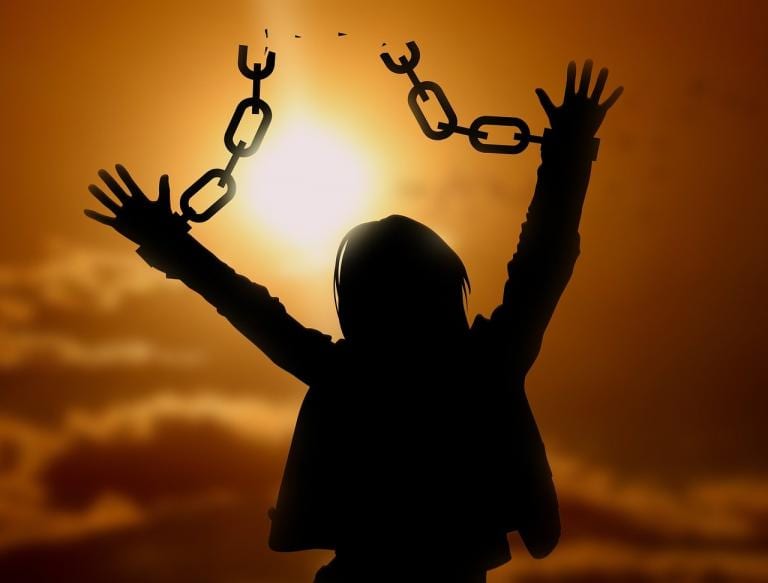“Freedom” is something we Americans value above all else, practically. But what does it mean? There are actually three generally-recognized kinds of freedom, plus another one that gets less attention but that may be the key to the whole concept.
That is what I learned from Casey Chalk’s piece in the Federalist entitled Freedom From Morality And Obligations Isn’t ‘Freedom’.
He is reviewing a book by the Polish anti-Communist dissident Ryszard Legutko, The Cunning of Freedom: Saving the Self in an Age of False Idols. Legutko explores these different kinds of freedom, showing their nature, their necessary limits, and how they are all going wrong in contemporary society.
I won’t go into the details of what Legutko and Chalk say about that. I urge you to read the review and Legutko’s book, which–judging from Amazon’s “Look Inside” feature–looks fascinating.
Right now, I’d just like to give you the definitions, along with a few thoughts of my own.
Negative Freedom
This refers to the absence of coercion.
Societies without any kind of coercion are impossible, since human beings will tend to misuse each other unless they are subject to some level of control. At the same time, excessive coercion, as under totalitarianism in which virtually every aspect of a person’s life is controlled by the state, is tyrannical.
Free societies will employ the least amount of coercion possible. The state might use coercion to prevent individuals from improperly coercing each other. This would be a society characterized by a high level of negative freedom.
I would add that the best kind of control is self-control. When human beings have such a moral and religious sensibility that they control themselves, they have little need for the coercive power of the state and thus have greater freedom.
Positive Freedom
This is a “set of qualities and conditions needed to achieve important aims.” That is, positive freedom has to do with the conditions necessary for human beings to pursue their goals.
Society has to be peaceful and orderly. A society without law and order has no positive freedom, since individuals will constantly be in danger from others.
Having a free economy requires certain laws that protect property, enforce contracts, support a currency, and so on. The freedom of entrepreneurs, business owners, and other individuals pursuing prosperity depends on these preconditions.
Some societies, of course, cultivate other kinds of positive freedom, adjusting their laws and customs to promote the goals of families or religions or education, or some combination thereof.
Inner Freedom
“Inner freedom is defined as being the author of one’s own actions.” This is probably the definition we think of most.
There are limits to inner freedom, as to the other kinds. There are limits to what we can be and what we can do. But having inner freedom is necessary for individual flourishing. It is opposed by pressures to conformity, collectivism, and refusal to respect the individual.
These different dimensions apply to the various realms of life–to political freedom, economic freedom, etc. To have freedom of speech, we must not be coerced as to what we may or may not say (negative freedom). We also must have access to a forum or a medium to express ourselves (positive freedom). And we must have something that we want to say (inner freedom). To have freedom of religion, we must not be coerced into believing or not believing a particular faith, nor must we be punished for our beliefs (negative freedom). We also need to have churches and other religious institutions, to have access to their teachings, and a climate that allows us to practice our faith (positive freedom). And we must have personal faith, convictions, and conscience (inner freedom).
Legutko believes that each of these kinds of freedom can be distorted and taken to extremes. I would say, for example, that the impulse for inner freedom is currently being exaggerated to the point of people insisting upon the inner freedom to author their own sexual identities, regardless of their bodies.
But Legutko also believes that today’s society, on the whole, suppresses freedom. There is more coercion and thus less negative freedom. The conditions for free actions have been restricted, limiting positive freedom. The peer pressure for conformity, exercised in social media, consumerism, and political correctness limits inner freedom.
He calls for another kind of freedom.
Transcendent Freedom
Says Chalk,
Part of the answer to what kind of freedom we should seek to protect and promote must be one that recognizes the transcendent nature of the human self. Moreover, the reason we “long to belong” is because it too is built into our nature. A pure libertarian freedom is wrong because it disables us from being able to unite to collective identities — family, church, civic society — that actually expand our freedoms.
This would tie in to the concept of Christian freedom. Whereas the conventional view is that moral rules restrict our freedom, as we have already seen above, morality is necessary for both negative and positive freedom. The Bible teaches that, far from sin being liberating, sin enslaves: “Jesus answered them, “Truly, truly, I say to you, everyone who practices sin is a slave to sin. The slave does not remain in the house forever; the son remains forever. So if the Son sets you free, you will be free indeed” (John 8:34-36).
This notion of Transcendent Freedom ties in to what I learned in a reading group I participate in, discussing the new LCMS systematic theology volumes, Confessing the Gospel: A Lutheran Approach to Systematic Theology. In the treatment of “Creation,” William Weinrich writes about how each created being finds fulfillment when it does what God created it to do, so that human beings are free when they fulfill God’s purpose for them. (Note the ties to vocation: this purpose is typically not some grandiose task but the created purposes of growing up, often getting married and having children, making a living, loving and serving one’s neighbor in ordinary life.) Sin violates God’s purpose for human life, so it is enslaving. Being delivered from this sin by the work of Christ and living out one’s faith in vocation is thus liberating.
This Transcendent Freedom ensures Negative, Positive, and Inner Freedom by preventing them from going off course and by grounding the Self in something greater than the Self.
Image by Elias Sch. from Pixabay














